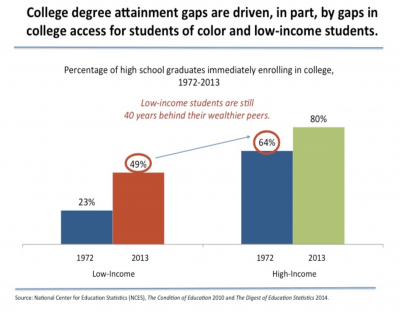In my AP Gov class I took a few years ago, we did extensive research on the correlation between wealth and race and higher education. We studied if what your race and annual income was had an effect on your level of education. My classmates and I found that there was in fact a direct correlation between the two things, and I have found a few charts to help visualize it.
It comes as no surprise that the higher salary one makes, the further along they’re going to go in their schooling. Compare an upperclass, white family in New England to a lower class, African American family in Baltimore. There is a much higher chance that the children in New England are going to receive a high level of education. And what’s the correlation? There are many factors that play into these outcomes, but the more financially stable a home is, the more time they have to focus on getting their kids to school, and the better areas they can live in with better school systems. A lot of the time, lower income families do not have the drive to send their children to school because they have too many other financial responsibilities to worry about, or they just do not live in an area with effective school systems/schools at all.
I watched a documentary called “Step” that follows a few girls throughout high school in Baltimore. Though the children may have had the motivation to do well in school, some of them weren’t being pushed or supported by their families because they didn’t have the time or money. Going to school should be a human right, but unfortunately, at least today, it is a privilege. Not enough kids have access to higher education, let alone education at all.




I found these statistics to be incredibly alarming, and it raised a number of questions in my mind. For example, what exactly do we think it is so prominent that other races other than whites have such different percentages of those recieving higher level education? I think this might connect with my graph, in which I showed the differences in annual average incomes amongst different demographics. Hispanics and blacks have much lower average incomes, so this could perhaps lead to the fact that you showed concerning less education. I wonder why this is the case, and how it could be fixed so that people are seen as more equal.
You do a great job highlighting a tremendous problem within this country. I have read multiple reports saying that if schools in Baltimore didn’t pass kids despite them receiving F’s or not even showing up to class at all, these schools would see graduation rates that are less than 50%. These numbers are astounding but they reflect an interesting dilemma. If the failure to not educate these students on the part of the school systems, or the infrastructure that makes up the area around these schools. Either way, I think you do an excellent highlighting the inequality between growing up in New England vs. Baltimore
The analysis between income level and education level is a rather scary topic to investigate. It is fascinating that your AP gov class was able to attack this topic and although I am not surprised with the results that were found it is a difficult pill to swallow. I also found your second graph on the level to college degrees that come from level of household income to be the same, a scary but unsurprising realization. It is further terrible that this seems to just be an accepted issue within the United Sates with limited allocated resources to fix these issues.